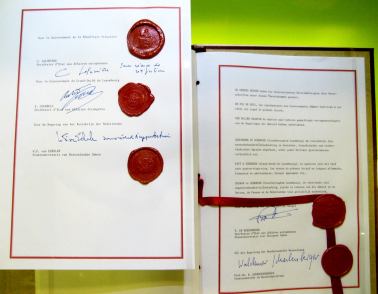The success of the Internet of Things (IoT) depends on sharing data between different devices but it needs to be done appropriately. But there are some brand new technologies that might support appropriate data sharing and they can do it on a massive scale.

Sharing (data) is good for us. The more we share then the more perspectives we have on any given consumer or any given problem. In retail this means getting a better understanding of what customers need even before they do. For the IoT this means combining the sensors and abilities of many devices to get a fuller picture of what’s needed and having more options on how to do it.
Firms that manufacture IoT products only get direct data from the customers that use their products. One device only ‘experiences’ a part of a customer’s life. To get a fuller understanding of a single customer’s life different devices need to share data, preferably devices that help the same customers in different ways.
The classic example is a shopping app on your phone that uses data from your refrigerator to suggest recipes based on what you actually have in stock. Or a firm that uses data from all the devices that it has sold in the past to give advice to specific customers, like Waze uses crowd sourced data on traffic jams to warn its users.
But really useful data can come from external sources.
Just like good feedback and useful suggestions, external information is more likely to give you a new perspective. So devices that share data with many other devices will tend to get more useful information and make better decisions. Decisions that are either more personalised, because of complementary information about the same user, or decisions that are chosen from more options, because of information on more user situations.
However, the problem is that firms don’t like to share with other firms for commercial reasons. More importantly, firms can’t just share customer data with any firm that they want to because of data protection legislation. How would you feel if your data was shared with anyone and everyone?
Of course you need some physical way of sharing the data, like Temboo’s stack or a platform like EVRYTHNG. But you also need some rules too.
The problem is that sharing data makes for better user services but sharing data must be done appropriately.
I’ve blogged about this before here, here and here. But now I’ve figured out how to do it using new technologies like smart contracts and blockchains.
Here’s the solution: if you want to share your data, meaning sell it or even just release the value in it for free, then first you need to stop talking about ‘data’. Be more specific. Being very specific is the key to reducing data sharing sensitivities.
If you ask me whether you can share all my data with everyone, everywhere and let them use it as they choose and pass it on to whoever they want to, forever. Then I’m going to get a bit tense.
But if you tell me exactly how you want to use it, why you need to use it, who else might get a look at it and what they are entitled to do with – either the data or the products of the data – and how long this is for. Then I will be much more open to your suggestions.
I still won’t give you my medical data so that your algorithm can charge me a higher insurance premium. And I hate it when it feels like my data is being used to sense when I will pay more for dodgy science fiction books on my Kindle or more expensive airline tickets.
But generally speaking a highly specific definition use of will remove a lot of my reservations. And real anonymisation will remove all of them. Q: who owns this anonymous data? A: dunno.
So how can we apply this to the IoT one devices at a time?
It is relatively easy to run a loyalty card programme because it is centralised and largely automated. But the IoT needs to be decentralised. If every device asks you or its manufacturer for permissions and instructions every time it needs data – or when is asked to supply data – then the IoT will not get very sophisticated.
So how do we ensure highly specific data sharing? Well, we need to design smartness into the IoT. So let’s use smart contracts.
Smart contracts are a mixture of contract law and software. The rules that govern a relationship between two parties are embedded in the software that facilitates the same relationship. To put it another way, the contractual terms are embedded in the thing that they govern. So they control it to help ensure that agreements are kept.
Software is made of rules and instructions for use but contracts also need proofs of things like identity, ownership, endorsements, permissions and rights to do things. And they need to be cryptographically secured, decentralised and machine readable so that every device can automatically ‘negotiate’ with other devices as required.
Fortunately all this can be written into blockchains, the distributed and cryptographically encoded databases that underlie digital currencies. In principle, the data sharing rules for each device can be broadly pre-specified; for consuming third-party data as well for supplying data.
Smart contracts could automate a multitude of interactions between IoT devices and pre-specify what constitutes appropriate behaviour in different circumstances. Automation is important because the more devices the better and the more granular the interaction then the smoother the service. Pre-specification is important because you do not know which devices your devices will meet.